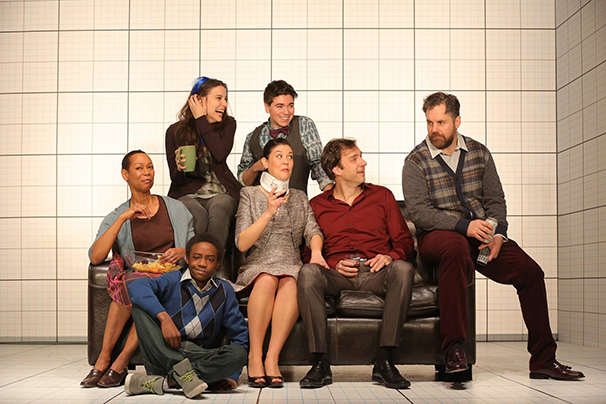
Whether it is the dozens of emails one receives every day or the staggering variety of television shows available on Netflix, people are constantly taking in more information than they can comprehend, and certainly more than they can handle. This experience is presented in “Love and Information,” Caryl Churchill’s play that opened at the New York Theater Workshop on Feb. 19.
Rather than having the structure of a normal play — following a set of characters from scene to scene — “Love and Information” is a series of vignettes featuring an ensemble cast of 15 actors playing dozens of different characters.
The scenes themselves run anywhere from six words to six minutes, and it is nearly impossible to keep track of how many scenes there are. In between each segment, the theater goes dark and, when the lights come up again, a completely different situation is revealed on the sparse white stage.
At first it is difficult to find a connection between the scenes. What does a couple picnicking on a first date have to do with a middle-aged woman grumpily filling out a census form? What does a discussion of memorization tactics have to do with a discussion about the concept of free will? But after perhaps a dozen scenes, the common theme (admittedly right there in the title) becomes clear — these people are all sharing and thinking about information.
Of course, this realization raises the question of what is and is not information. As explained by one character, “Sex is information.” In these terms, it is genetic information, but information nonetheless. Information is the building block on which our world is built. Telling someone you love them is information, just like the capital of Bosnia-Herzegovina is information.
While it is hard to become deeply invested in any of the characters because of the abbreviated nature of their scenes, most audience members will see aspects of themselves reflected on stage. The sheer number of people portrayed means that, as the characters share their secrets and worries, everyone will find something they can connect to on a personal level.
The show itself is flawlessly designed. Miriam Buether’s Spartan set (a white box stage in a black box theater) and Peter Mumford’s inventive lighting pair perfectly, creating the illusion of simplicity among the chaos of the play’s constant activity. James MacDonald’s direction helps the talented cast channel the anxiety, happiness, anger and love that are present in the characters.
These feelings are what we take from the theater when “Love and Information” ends. In the complete flood of information witnessed in less than two hours, the emotions ultimately have a lasting impact. While information may be visible in everything, love is just as present.
“Love and Information” is playing at the New York Theater Workshop, 79 E. Fourth St. through April 6.
A version of this article appeared in the Monday, Feb. 25 print edition. Dylan Jarrett is books/theater editor. Email her at [email protected].























































































































































